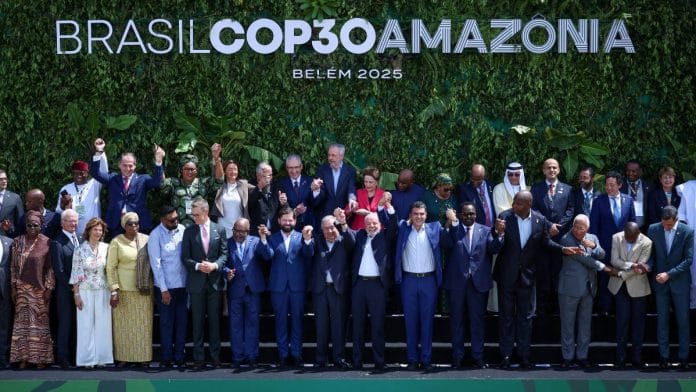New Delhi: There are more than 1,600 fossil fuel lobbyists at the ongoing COP30 in Brazil, the biggest share in proportion to other delegates than at any other COP in history, according to Kick Big Polluters Out (KBPO), a global coalition of more than 450 organisations that are demanding an end to the ability of big polluters to write the rules of climate action.
Except for Brazil, fossil fuel lobbyists outnumber every other country’s delegation to the United Nations Framework Convention on Climate Change (UNFCCC)’s 30th annual conference (COP30).
“The number of fossil fuel lobbyists present at this conference makes it very clear whose voices are being heard, whose aren’t, who is in control of power and who is given access to make decisions on climate issues,” KBPO coordinator Rachel Rose Jackson said in a communication Friday.
As world leaders and delegations meet in Brazil’s Belém to make important decisions on issues such as climate finance, adaptation to climate change, and reducing nationwide emissions from fossil fuels, there is an “overwhelming” presence from the very same fossil fuel industries.
The Belem COP30 is especially significant since it is happening in the heart of the Amazon rainforest, and yet only a mere 900 delegates of indigenous communities from around the world are represented at the conference.
On Friday, members of the Munduruku indigenous group of Brazil staged a protest outside COP30’s gates, demanding a stop to extractive development projects in the Amazon, Reuters reported.
This is not the first COP where coal, oil and gas lobbyists are present, with over 1,700 of such lobbyists attending the event last year in petrostate Azerbaijan. Before that, there were more than 2,400 fossil fuel delegates at COP28 in Dubai. However, COP30 is significant because fossil fuel lobbyists are highest in proportion to other delegates than ever before.
In a press conference Friday, KBPO stressed on how the presence of fossil fuel lobbyists outnumbered delegations from countries actually suffering from climate crises.
Jax Bongon, a delegate from the Philippines and member of KBPO, spoke about how his country was still suffering the effects of multiple typhoons even as COP30 was under way.
“Right now, back home in the Philippines, we’re still reeling from typhoon after typhoon. Unprecedented floods, many lives lost and still missing,” Bongon said. “There are 1,600 fossil fuel lobbyists here, and they outnumber delegates from the Philippines by 50-to-1. That contrast is jarring!”
Not just the Philippines, but the 10 most climate vulnerable countries in the world—including Chad, Niger, Solomon Islands, Sudan—together do not have as many delegates as fossil fuel lobbyists at COP30.
Apart from trade associations such as the International Emissions Trading Association, fossil fuel lobbyists are also members of official country delegations like France, Norway and Japan. Members from the world’s largest oil and gas companies, including ExxonMobil, British Petroleum, and TotalEnergies, make up most of these delegates.
The presence of fossil fuel lobbyists is concerning because of the conflict of interest they generate in climate negotiations, which are aimed at reducing fossil fuel use.
In an analysis by the Indian think-tank Sustainable Futures Collaborative on 4 November, explaining how 30 years of climate negotiations have evolved at COP, the role of fossil fuel lobbyists was also emphasised.
“This tendency towards inadequate and unmet promises has been an ongoing feature of climate multilateralism. It can be attributed to … weak enforcement by UNFCC, under-represented Global South, and vested interests and lobbying by fossil fuel industry,” said the analysis.
The KBPO has also released a report on the presence of over 5,000 fossil fuel lobbyists at COP from 2021 to 2024. Significantly, the fossil fuel companies present at these COPs also invested over $35 billion in the same period looking for new oil and gas fields, exposing their intentions to continue producing fossil fuels.
With the UNFCCC and the COP being criticised for failing to meet promises of climate finance for developing countries, or being unable to reduce emissions to keep global warming to 1.5 degrees Celsius below pre-industrial levels, it is not hard to connect the dots.
“It’s common sense that you cannot solve a problem by giving power to those who caused it. Yet three decades and 30 COPs later, more than 1,500 fossil fuel lobbyists are roaming the climate talks as if they belong here,” said Bongon.
“It is infuriating to watch their influence deepen year after year, making a mockery of the process and of the communities suffering its consequences.”
(Edited by Nida Fatima Siddiqui)
Also Read: Why EU’s ‘66-72% cut in emissions by 2035’ pledge is being seen as a cop-out ahead of COP-30






